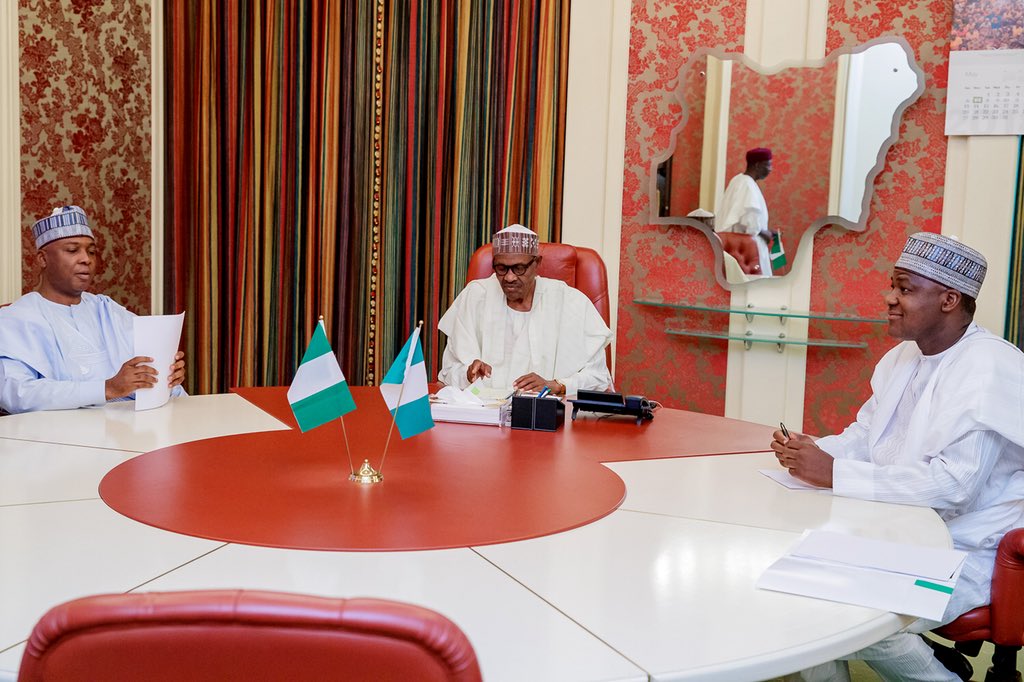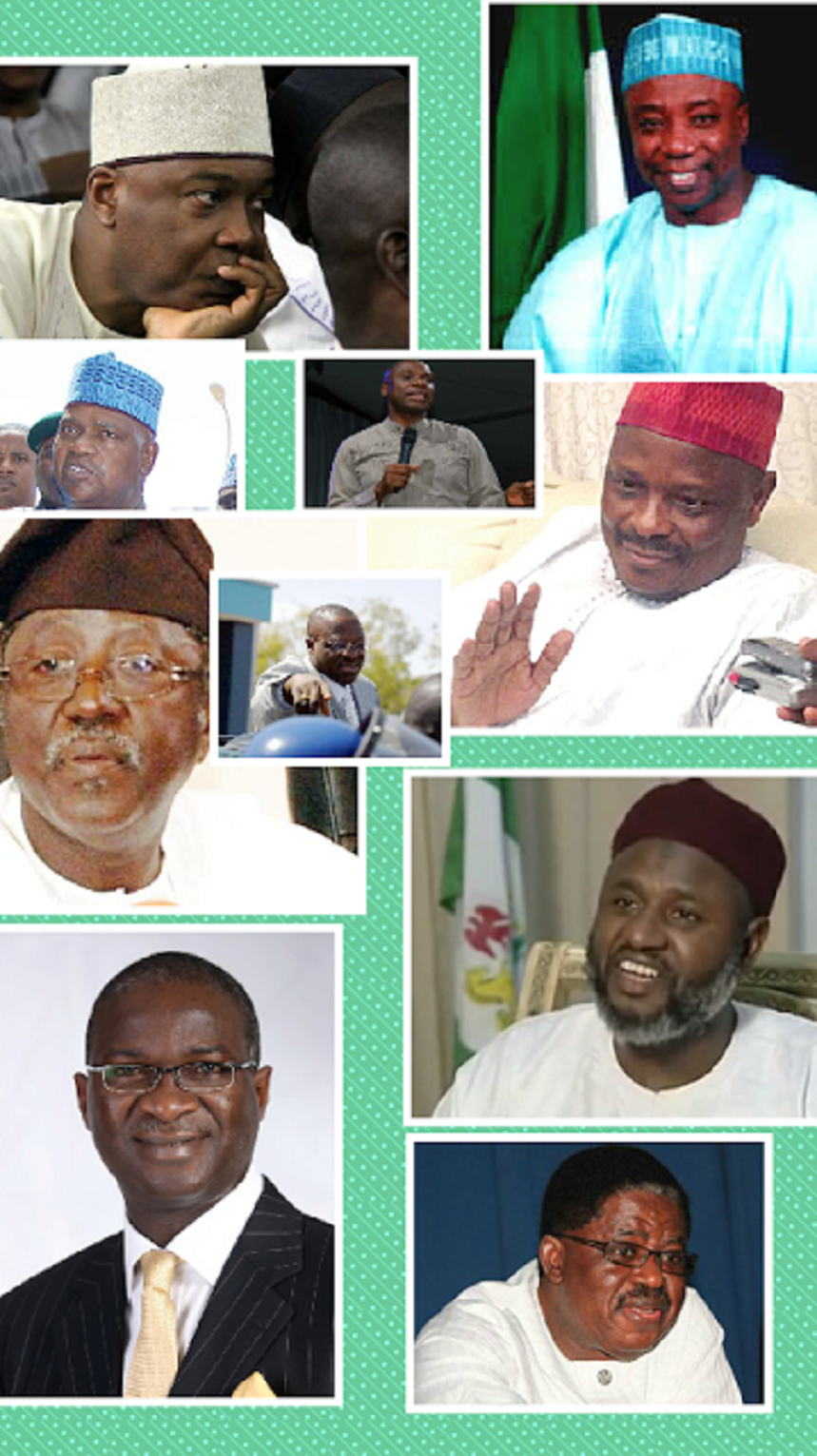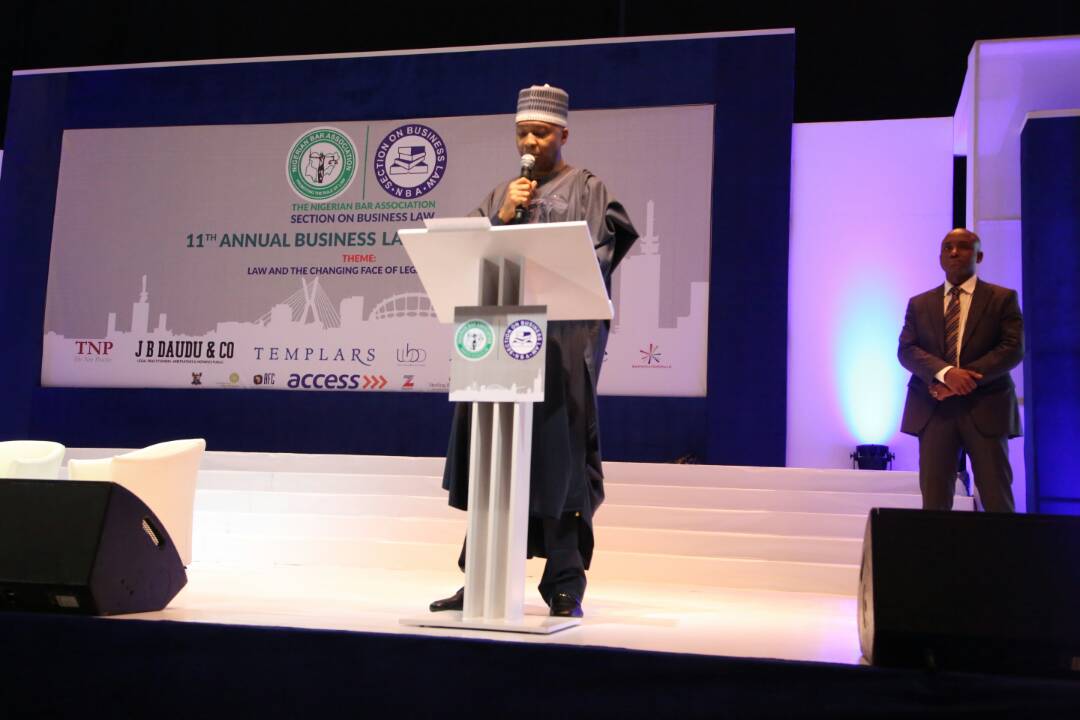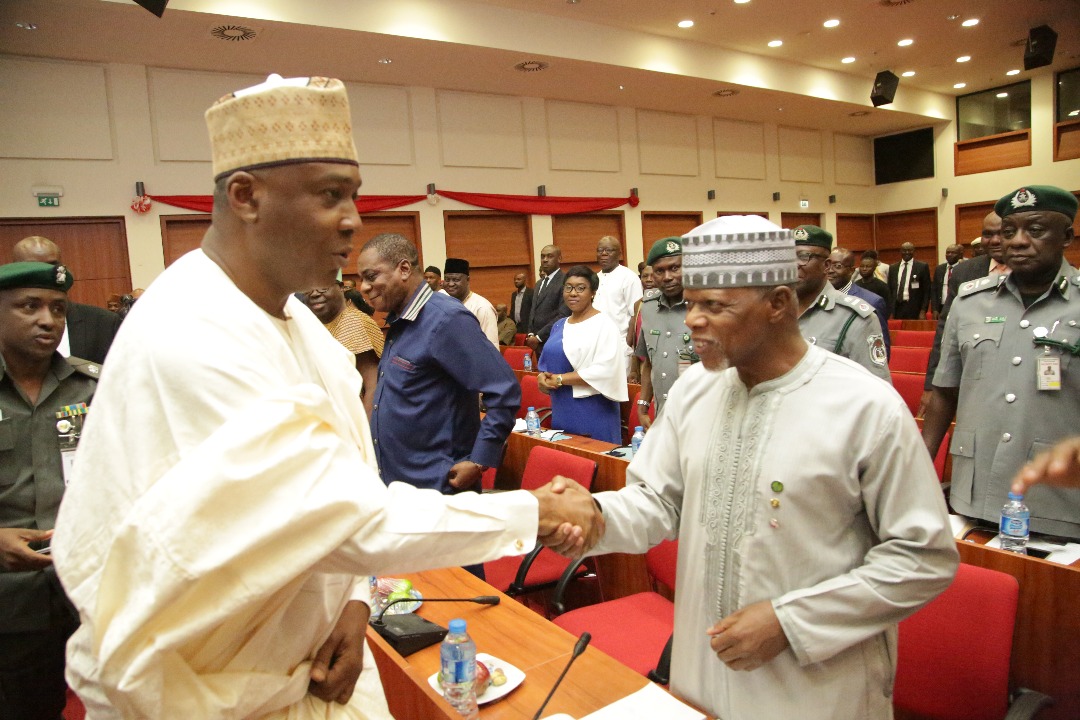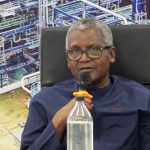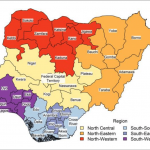General
Saraki, Civil Societies Want Child Rights’ Law Domesticated
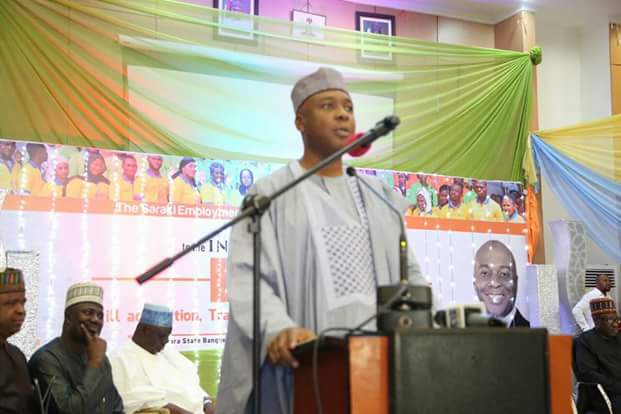
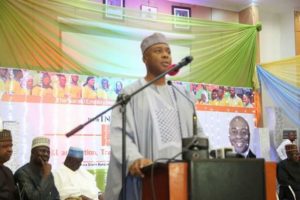
By Dipo Olowookere
The domestication of and strict implementation of the Child Rights Act (CRA) across the country has been advocated for by the Senate President, Mr Bukola Saraki and a group of Civil Society Organization (CSOs).
Speaking at a roundtable on ‘Advancing the Rights of the Nigerian Child’ organized by the Office of the Senate President in commemoration of the 2017 Children’s Day celebration in Abuja, Mr Saraki lamented that out of every five children, two currently live in poverty, millions in poor housing, crowded rooms, squalid conditions, on streets and affected by communal conflicts and insurgency.
He argued that “these type of beginnings can hold a child back for the rest of his or her life. At just 22 months, a poor child’s skills already trail behind those of better-off toddlers. At age five, that poor child, even if he or she is very bright, will have been overtaken at school by a less talented but more privileged classmate.”
He noted that, “Releasing these children from that trap, unleashing their potentials is critical if we are to create a society that is truly fair. A starting point is to review what protection our laws offer this demographic vulnerability.”
While wishing Nigerian children a happy celebration, Mr Saraki noted that the event was meant to celebrate the resilience and perseverance of Nigerian children in overcoming the many obstacles of childhood.
“With this in mind, we celebrate the recent release of the 82 Chibok girls and take time to make constructive and critical evaluation of our commitment to the next generation,” Mr Saraki said.
He further stated that the existing laws which offer special protection to children and other vulnerable groups in the country include the Violence Against Persons Prohibition Act, (VAPP Act, 2015) and the Child Rights Act (2003).
“These laws contain specific provisions to protect the Nigerian child. In order for our objective to be realized, much more needs to be done at all levels of State governance, but particularly at the local level, through meaningful cooperation and collaboration of all actors involved in the field of protecting children.
“The need remains to establish well-functioning Child Protection Units, provide quality social services for child protection and empower families in need.
“The domestication of the Child Rights Act has been concluded in 24 States. Other States are examining it to see how it relates to local sensitivities and values, and thereby make the law more relevant and effective. It is my hope that the scrutiny of the Act will enhance its inclusiveness and the comprehensive protection and the Nigerian child,” he said.
He stated that domestication and strict implementation of CRA and VAPP are critical for success in the battle to raise a future generation of national touch bearers.
“I must also add that, domestication alone will not turn the tide; we must be willing to vigorously implement the law to match words with action,” Saraki said. “Otherwise we risk making a caricature of ourselves, government, and governance if we fail to give the law teeth to protect the vulnerable for whom we are gathered today.”
He enjoined State Houses of Assembly, traditional heads, political leaders, civil societies and all Nigerians to initiate discussion at their various levels, to ensure that all stakeholders are carried along and their views captured in the advocacy to fully domesticate and implement the CRA.
“We in the 8th Senate are willing to back you up by ensuring adequate appropriation to institutions charged with response and protection such as the police and public health agencies,” he said. “In the years to come, I want us to be able to turn around and say that Nigeria is an ideal place to raise a child.”
“I want us to be able to look back and say: We tackled the deficit, we protected the futures of our children, and we gave them the childhood they deserved. These are not big ambitions. This is what government and leaders are here to do!” he added.
In his remarks, Speaker of the Bauchi State House of Assembly, Mr Kauwa Damina, reaffirmed the commitment of the Bauchi Assembly to domesticate the CRA in view of the centrality of children to the growth and development of the country.
On her part, Professor Joy Ezillo of the University of Nigeria, Nsukka called on the nation’s leaders to reflect their love for children with action and appropriate foster, adoption and child support laws.
Others at the event were representatives of the European Union (EU), The Malala Foundation, United Nations Children’s Fund (UNICEF), National Council of Women Societies (NCWS), Youths of Africa, National Democratic Institute (NDI), Civil Society Legislative and Advocacy Centre (CISLAC), and a cross section of teachers, students and pupils from primary and secondary schools in Abuja.
General
Excitement as Nigeria Exits EU’s High-Risk Financial List

By Adedapo Adesanya
The European Union (EU) has officially removed Nigeria from its list of High-Risk Third Country Jurisdictions.
This decision follows Nigeria’s successful exit from the Financial Action Task Force (FATF) “grey list” in late 2025, signaling international recognition of the country’s improved anti-money laundering and counter-terrorism financing (AML/CFT) frameworks.
The development is expected to ease trade, payments and investment flows between the country and Europe
The European Commission confirmed that Nigeria, alongside South Africa, Burkina Faso, Mali, Mozambique and Tanzania, had strengthened its AML/CFT regimes and no longer posed “strategic deficiencies” under EU assessment standards.
The commission noted that the affected countries had implemented reforms that brought their financial systems in line with international standards set by the FATF.
Reacting to the development, the Minister of State for Finance, Mrs Doris Uzoka-Anite, described Nigeria’s removal from the list as a major boost to investor confidence.
On a post on X on Thursday, she wrote, “Big win for Nigeria! Removed from EU’s financial ‘high-risk’ list!Congrats to President @officialABAT on this achievement. As Minister of State for Finance, I’m proud of this boost to trade and investor confidence.”
Being on the EU’s high-risk list previously meant that transactions with European partners required enhanced due diligence, stricter documentation, and additional oversight.
Nigerian businesses and banks faced increased scrutiny, which slowed cross-border trade and complicated investment flows.
The lifting of enhanced due diligence requirements is scheduled to take effect on January 29, 2026, following confirmation by the Commission confirmed that Nigeria has addressed strategic deficiencies and strengthened its financial governance through critical legislative reforms, such as the Money Laundering (Prevention and Prohibition) Act.
The development could have a series of positive impact including the provision of several immediate and long-term benefits as well as reduction of compliance costs.
As a result, EU financial institutions will no longer be legally required to apply “enhanced due diligence” to transactions involving Nigeria, which previously involved more intrusive checks and rigorous documentation.
It will also enhance smoother cross-border trade by simplifying trade and payment flows between Nigeria and European partners, reducing the complexity and time required for transactions.
Nigerian officials, including the Minister of State for Finance, have highlighted this as a “major boost” to investor confidence, positioning Nigeria as a more credible destination for international capital.
General
Dangote Cement Distributors, Customers Share N15bn Gifts, Cash at Awards Nite
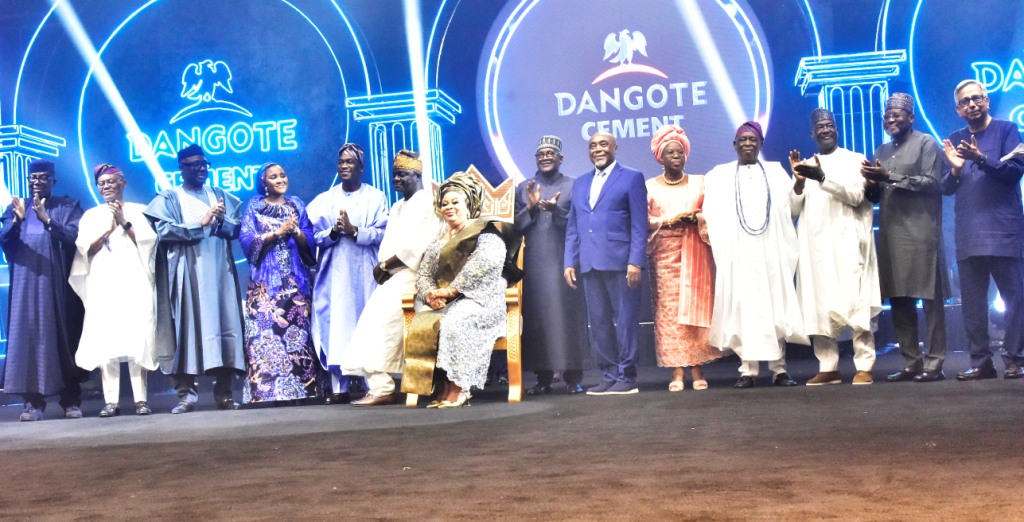
By Aduragbemi Omiyale
Cash and gifts worth about N15 billion were given out to distributors and customers of Dangote Cement Plc at a ceremony organised to reward their continued loyalty, resilience, and outstanding performance.
At the event, held recently at Eko Convention Centre, Lagos, the chairman of president of Dangote Industries Limited, Mr Aliko Dangote, described the distributors as the heartbeat of the organisation and thanked them for their dedication in ensuring the Dangote products reach communities nationwide.
Business Post reports that the 2026 Distributors’ Awards Night, held under the theme, Partner for Growth, recipients received an impressive array of gifts, including cash prizes, containers of cement, high-end SUVs, and CNG-powered trucks.
Mr Dangote used the occasion to reiterate the company’s Vision 2030 strategy, aimed at transforming Dangote Group into a $100 billion enterprise by 2030.
The plan, he explained, focuses on industrial expansion, cross-border investments, and building Africa’s self-sufficiency in sectors such as energy, manufacturing, and infrastructure.
“Your tireless work in the field, your alluring commitment to our products and your direct engagement with our customers are what turn our vision and strategies into tangible results,” he posited.
“Vision 2030, an integral aspect of our Africa First project, was borne out of my firm belief that Africa’s future will be built by Africans who refuse to accept limits – people who dream big, work hard, and never stop believing in what is possible,” he added.
On his part, chairman of the board of Dangote Cement, Mr Emmanuel Ikazoboh, highlighted the critical role of distributor partnerships in ensuring the company’s products reach every corner of the country.
“Tonight, we are giving out about ₦9 billion in cash to our distributors. For some of you, it will be a double celebration, as you may receive two alerts in recognition of both your volume and growth results,” he disclosed.
“In addition to the cash prizes, we have prepared other exciting gifts, including CNG-powered trucks, high-end cars, and more, to show our appreciation for your commitment and outstanding performance,” he added.
The board chairman further outlined the company’s plans to start the year strong by supporting its distributor partners, stressing the importance of supply chain efficiency and profitability as key pillars for growth.
Mr Ikazoboh also noted that the company has invested in new CNG-powered trucks, as the company’s target at the end of 2027 is to have all its trucks CNG-powered, supporting both logistics efficiency and empowering customers.
“We have made significant investments in new Compressed Natural Gas (CNG)-powered trucks. This initiative not only empowers our customers but also emphasises our dedication to corporate responsibility and global sustainability guidelines. These rewards reflect our promise to support customers and champion sustainable business practices,” he stated.
General
Navy Launches Operation Delta Sentinel to Achieve 2.5mb/d Oil Output

By Adedapo Adesanya
The Nigerian Navy has launched Operation Delta Sentinel, a new maritime security initiative designed to curb crude oil theft, secure critical oil assets and support the federal government’s ambition to ramp up crude production to 2.5 million barrels per day by 2027.
The operation, which replaces Operation Delta Sanity II, was formally unveiled at the Nigerian Navy Ship (NNS) Pathfinder Jetty in Port Harcourt, marking a renewed push to stabilise the Niger Delta and protect Nigeria’s oil-dependent economy.
Speaking at the launch, Commander Task Group 26.1, Operation Delta Sentinel, Rear Admiral Suleiman Ibrahim, said the initiative was aligned with the Federal Government’s drive to boost oil exploration and production under the Project 1 Million Barrels Per Day initiative of the Nigerian Upstream Petroleum Regulatory Commission (NUPRC).
“The transformation from Operation Delta Sanity II to Operation Delta Sentinel is necessitated, among other considerations, by the Federal Government drive to increase oil exploration and production,” he said, adding that, “It is further anticipated that oil production would be about 2.5 million barrels per day by 2027.”
Rear Admiral Ibrahim, who is also the Flag Officer Commanding, Central Naval Command, said Operation Delta Sentinel would run for an initial one-year period, subject to 90-day renewable mandates, and would focus on denying criminal networks access to Nigeria’s maritime and oil infrastructure.
“Our objective is clear and unambiguous: to deny criminal elements freedom of action, protect critical national oil assets, support legitimate economic activities and contribute to enduring peace and stability in the Niger Delta,” he stated.
He explained that the operation would rely heavily on intelligence-driven missions, enhanced inter-agency collaboration and advanced surveillance tools, including Maritime Domain Awareness infrastructure, new maritime platforms, and manned and unmanned air assets.
“Our approach will be deliberate, innovative and technology-enabled. These capabilities will enable us to optimise asset utilisation, improve situational awareness and maintain a proactive operational posture,” he added.
The Navy said early indicators already show progress, noting that crude oil losses have dropped by about 90 per cent, from 102,900 barrels per day in 2021 to 9,600 barrels per day as of September 25.
Earlier, Flag Officer Commanding, Eastern Naval Command, Rear Admiral Chiedozie Okehie, highlighted the achievements of Operation Delta Sanity II, which was launched on December 30, 2024, to combat crude oil theft, illegal bunkering and pipeline vandalism.
“Operation Delta Sanity II lived up to expectations and made measurable contributions to national security and economic stability,” the Naval commander said.
According to him, between January 1 and December 31, 2025, the operation led to the arrest of 203 suspects, the deactivation of 324 illegal refining sites, and the seizure of stolen petroleum products valued at over N3.65 billion.
“An estimated 3.78 million litres of stolen crude oil, over 1.09 million litres of illegally refined AGO, 86,210 litres of PMS and 74,300 litres of kerosene were seized and appropriately handled,” he disclosed.
Rear Admiral Okehie added that the Navy’s operations, supported by collaboration with regulators, security agencies, oil industry stakeholders and host communities, contributed to a significant decline in crude oil losses, with NUPRC reporting the lowest loss levels since 2009 in September 2025.
With Operation Delta Sentinel now in force, the Navy said it is positioning itself as a key enabler of Nigeria’s oil production growth, investor confidence and long-term stability in the Niger Delta.
-

 Feature/OPED6 years ago
Feature/OPED6 years agoDavos was Different this year
-
Travel/Tourism9 years ago
Lagos Seals Western Lodge Hotel In Ikorodu
-

 Showbiz3 years ago
Showbiz3 years agoEstranged Lover Releases Videos of Empress Njamah Bathing
-

 Banking8 years ago
Banking8 years agoSort Codes of GTBank Branches in Nigeria
-

 Economy3 years ago
Economy3 years agoSubsidy Removal: CNG at N130 Per Litre Cheaper Than Petrol—IPMAN
-

 Banking3 years ago
Banking3 years agoFirst Bank Announces Planned Downtime
-

 Banking3 years ago
Banking3 years agoSort Codes of UBA Branches in Nigeria
-

 Sports3 years ago
Sports3 years agoHighest Paid Nigerian Footballer – How Much Do Nigerian Footballers Earn



